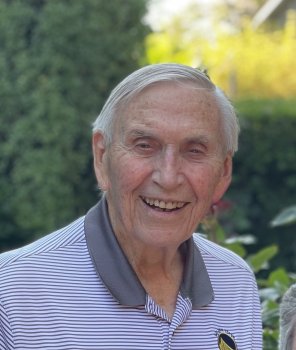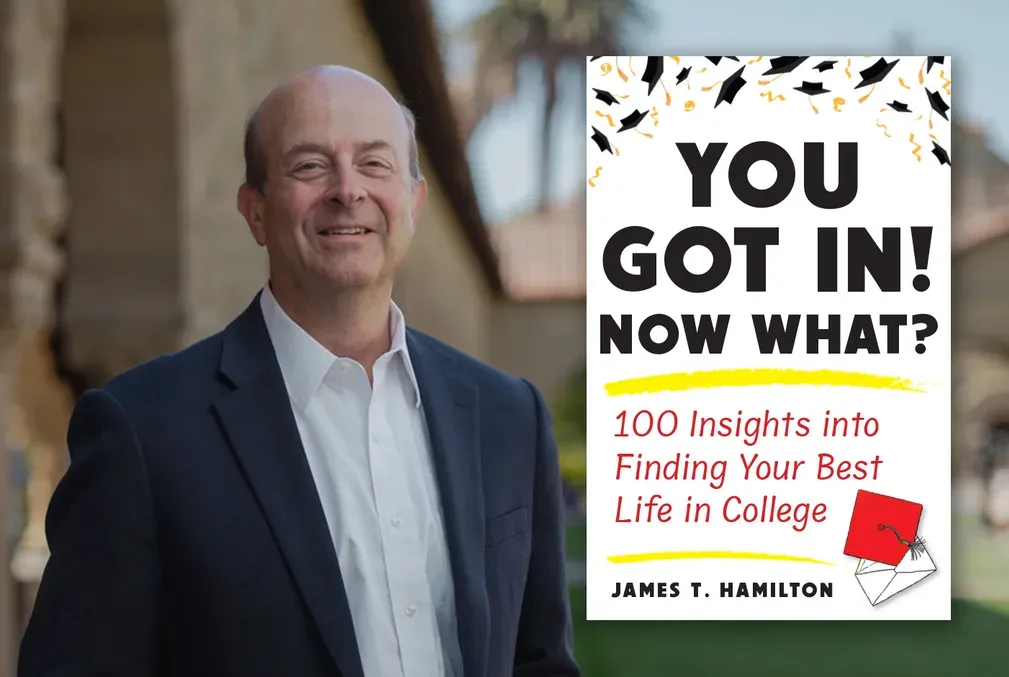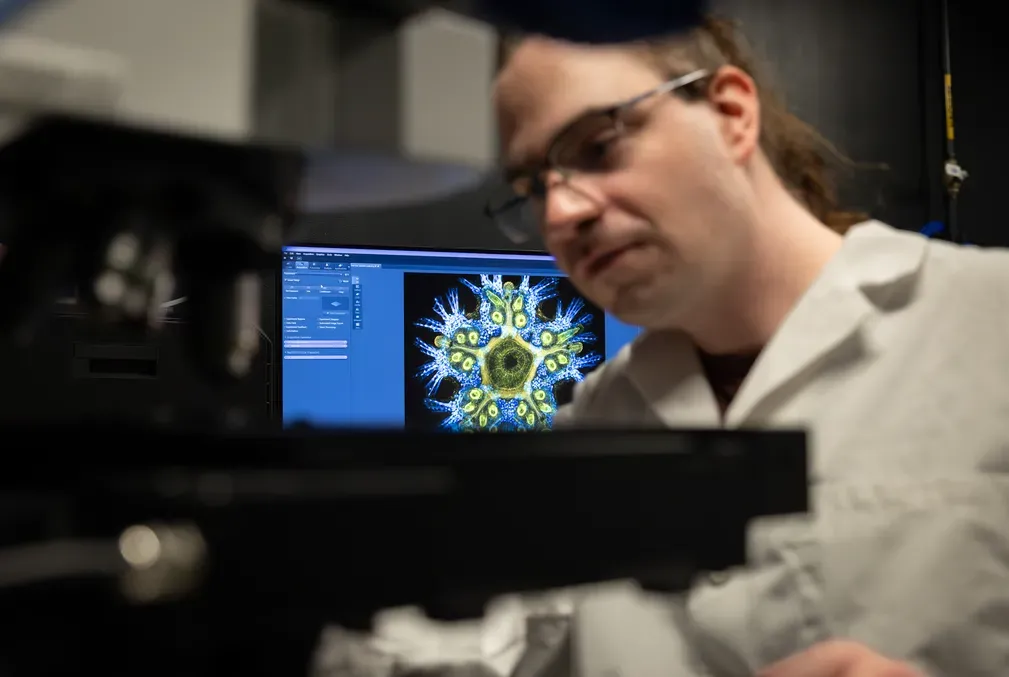Carl Gotsch, agricultural economist who contributed to Green Revolution, dies at 89
The former associate director of Stanford’s Food Research Institute, Gotsch was a technology evangelist best known for his research on irrigation development in South Asia and use of mathematical models to study agricultural policy.
Carl Gotsch, professor emeritus of food research at the School of Humanities and Sciences and a self-described tech junkie who promoted the use of microcomputing to improve agricultural management, died June 12 at his home in Palo Alto. He was 89.
Gotsch joined the faculty of Stanford’s Food Research Institute in 1976 and became its associate director in 1992. He played a key role in augmenting the institute’s master of arts program to emphasize the practical techniques of agricultural policy analysis and how to promote the results through effective writing and presentation, said Scott Pearson, who directed the institute from 1992 to 1996.
“Carl and I co-designed and co-directed that upgraded MA program, which grew to about 50 students annually and quickly became one of the top-ranked MA programs in international development,” Pearson said. The institute closed in 1996. Gotsch retired the same year.
Gotsch is perhaps best known for his work on water-resource development in South Asia, the Middle East, and North Africa. He used innovative statistical techniques to evaluate how irrigation contributed to crop production as well as mathematical models to investigate agricultural price policy, the demand for farm labor, and the effect of farm size on incomes.
In the 1960s, Gotsch analyzed and promoted the development of privately owned tube wells in Pakistan. In combination with high-yielding varieties of grains and chemical fertilizers, the wells, which used a motorized pump to extract groundwater through a pipe placed in a borehole, furthered the Green Revolution—a phenomenal increase in crop production in South Asia and other developing regions of the world—that drastically reduced poverty levels and hunger.
“His work on tube well development at the time of the Green Revolution in Pakistan was enormously helpful in changing the country’s agricultural development strategy,” said Walter Falcon, the Helen C. Farnsworth Professor of International Agricultural Policy, Emeritus, and former director of the Freeman Spogli Institute for International Studies.
Falcon, who directed the Food Research Institute from 1972 to 1992, and Gotsch were known as the “tube well twins” for their pioneering efforts in South Asia to understand the impact of the technology and foster its use.
“For Carl, the joy was in solving a problem—much less so in writing up the solutions,” Falcon said. “He was great to be with—an easy conversationalist who made friends easily. He had an infectious enthusiasm about his work. No one was ever negative around Carl.”
Boyhood in Idaho
Carl Hugo Gotsch was born in Ontario, Oregon, but grew up just across the border in Parma, Idaho, a small farming community. His parents, German immigrants, had two other children, both boys. With his brothers, Gotsch spent his childhood camping, fishing, and riding horses.
He earned a bachelor’s degree in agriculture in 1956 and a master’s degree in agricultural economics in 1960 from the University of Idaho. Gotsch then spent a year studying in Germany at the University of Kiel on a Fulbright Fellowship. In 1966, he earned a doctorate in economics from Harvard.
Gotsch served as an assistant professor of economics at Harvard from 1966 to 1969 and then as a lecturer there until 1976. In 1973, Gotsch, his wife, and their two daughters moved to Beirut, where he served as a project specialist in charge of developing the Ford Foundation’s agricultural economics program in the Middle East. The family had to leave Lebanon a few years later after civil war broke out.
Technology champion
In the early 1980s, Gotsch began studying how microcomputers—essentially, personal computers—could serve as tools for the collection and analysis of agricultural data. He found that the use of microcomputers, which were considerably less expensive than mainframe computers, could greatly benefit agricultural research in developing countries. Yet organizations were reluctant to adopt the technology.
“I recall his determined efforts to convince skeptical researchers and policymakers in Egypt, Kenya, and Pakistan of the enormous benefits of using microcomputers to analyze large data sets,” said Pearson, the former director of the Food Research Institute.
Gotsch also encouraged his colleagues at Stanford to embrace new technology. “I remember that Carl was adamant that the FRI faculty quickly adopt the new technologies associated with microcomputers,” Pearson said. “When he insisted on selling me on the advantages of opening an email account, I told him that this phenomenon was likely to be a passing fancy used mainly by geeks. Carl persisted, and we FRI faculty were some of the first at Stanford to use email regularly in our correspondence.”
In a 1994 article published by the Stanford News Service, Gotsch lamented what he considered the slow acceptance and use of computer technology for teaching at Stanford. “Here we are sitting in the middle of the Silicon Valley and there are pockets of real knowledge all over campus, but dissemination throughout the faculty lags,” he said.
A kind and patient mentor
Gotsch’s former students remember him as a kind and patient mentor.
“I was one of the many students who referred to him as Uncle Carl in appreciation for the care that he showed to us,” said John Kerr, who earned a doctorate in 1990 at Stanford and is now a professor of community sustainability at Michigan State University. “I am pleased to say I am known as a good, caring adviser, and I am even more pleased to say that I learned all the most important things about advising from Carl, who taught me by example.”
Rosamond Naylor, the William Wrigley Professor and professor of global environmental policy at the Stanford Doerr School of Sustainability, recalled that during her first summer as a graduate student at the Food Research Institute, in 1985, she and Gotsch taught a class to agricultural professionals from around the world who wanted to learn modeling techniques on laptops, which were pretty new at the time. “Some days we would hit a computer glitch that would stall progress, and Carl would work patiently and tirelessly to resolve the issue,” she said. “If he could figure it out by the end of the day—even when hours and hours had passed with no progress—he would turn to me and say, ‘This has been a great day!’”
She added: “I never did have Carl’s patience, but I couldn’t help but laugh with him when he said those words. I have always tried to keep his perseverance in mind as I’ve gone through my career.”
Gotsch authored or co-authored dozens of research papers, monographs, and book chapters. In addition to the Fulbright Fellowship, he was awarded an Iddings Research Fellowship and a Woodrow Wilson Fellowship.
He is survived by his wife, Alexandra Gotsch; brothers, Hans Gotsch and Bill Gotsch; daughters, Liza Pigram and Sonia Chessen; and four grandchildren.




